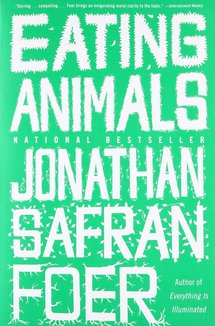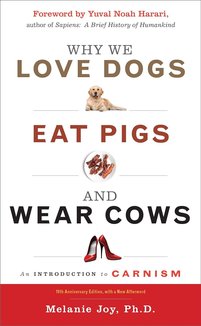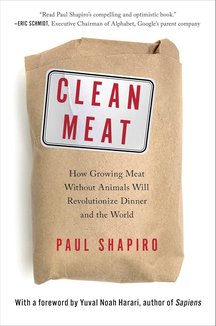Recommended Books

Eating Animals
Author:
Jonathan Safran Foer
ISBN 13:
978-0316069885
Part memoir and part investigative report, Eating Animals is the groundbreaking moral examination of vegetarianism, farming, and the food we eat every day that inspired the documentary of the same name. Bestselling author Jonathan Safran Foer spent much of his life oscillating between enthusiastic carnivore and occasional vegetarian. For years he was content to live with uncertainty about his own dietary choices but once he started a family, the moral dimensions of food became increasingly important. Faced with the prospect of being unable to explain why we eat some animals and not others, Foer set out to explore the origins of many eating traditions and the fictions involved with creating them. Traveling to the darkest corners of our dining habits, Foer raises the unspoken question behind every fish we eat, every chicken we fry, and every burger we grill. Part memoir and part investigative report, Eating Animals is a book that, in the words of the Los Angeles Times , places Jonathan Safran Foer "at the table with our greatest philosophers" -and a must-read for anyone who cares about building a more humane and healthy world.

Why We Love Dogs, Eat Pigs, and Wear Cows: An Introduction to Carnism, 10th Anniversary Edition
Authors:
Yuval Noah Harari
,
Melanie Joy PhD
ISBN 13:
978-1590035016
An Introduction to Carnism. “An important and groundbreaking contribution to the struggle for the welfare of animals.” — Yuval Harari, New York Times best-selling author of Sapiens: A Brief History of Humankind “An absorbing examination of why humans feel affection and compassion for certain animals but are callous to the suffering of others.” — Publishers Weekly Why We Love Dogs, Eat Pigs, and Wear Cows offers an absorbing look at what social psychologist Melanie Joy calls carnism , the belief system that conditions us to eat certain animals when we would never dream of eating others. Carnism causes extensive animal suffering and global injustice, and it drives us to act against our own interests and the interests of others without fully realizing what we are doing. Becoming aware of what carnism is and how it functions is vital to personal empowerment and social transformation, as it enables us to make our food choices more freely—because without awareness, there is no free choice.

Clean Meat: How Growing Meat Without Animals Will Revolutionize Dinner and the World
Authors:
Yuval Noah Harari
,
Paul Shapiro
ISBN 13:
978-1501189081
Paul Shapiro gives you a front-row seat for the wild story of the race to create and commercialize cleaner, safer, sustainable meat—real meat—without the animals. From the entrepreneurial visionaries to the scientists’ workshops to the big business boardrooms—Shapiro details that quest for clean meat and other animal products and examines the debate raging around it. Since the dawn of Homo sapiens some quarter million years ago, animals have satiated our species’ desire for meat. But with a growing global population and demand for meat, eggs, dairy, leather, and more, raising such massive numbers of farm animals is woefully inefficient and takes an enormous toll on the planet, public health, and certainly the animals themselves. But what if we could have our meat and eat it, too? The next great scientific revolution is underway—discovering new ways to create enough food for the world’s ever-growing, ever-hungry population. Enter clean meat—real, actual meat grown (or brewed!) from animal cells—as well as other clean foods that ditch animal cells altogether and are simply built from the molecule up. Also called lab-grown meat, cultured meat, or cell-based meat, this race promises promise to bring about another domestication. Whereas our ancestors domesticated wild animals into livestock, today we’re beginning to domesticate their cells, leaving the animals out of the equation. From one single cell of a cow, you could feed an entire village. And the story of this coming “second domestication” is anything but tame.